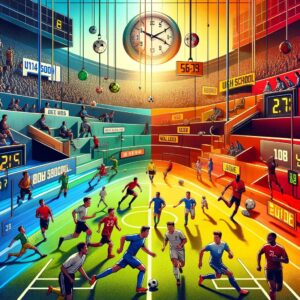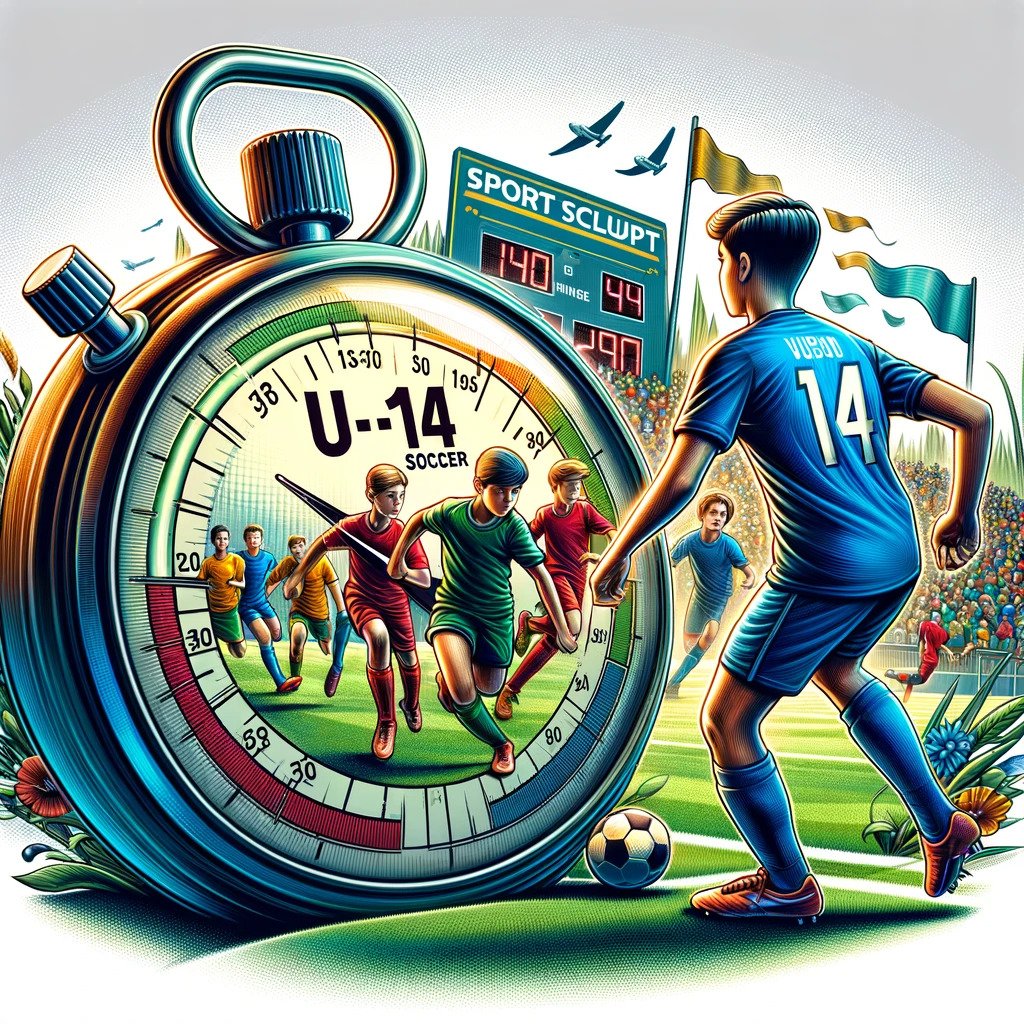When people often assume the length of a soccer game, especially for younger players like those in the U14 category, the truth is it’s not always a straightforward answer. As a busy parent or a new soccer coach, you might find yourself wondering about the exact duration of these matches. This article is here to guide you through the intricacies of game time in youth soccer.
The length of U14 soccer games can vary significantly. This variation depends on a myriad of factors, including the type of competition, specific league rules, and sometimes even the weather conditions. In general, you can expect these matches to consist of two halves, with each half being a certain number of minutes. There’s also a half-time break to consider, a short interlude allowing players to rest and prepare for the second half.
For those playing or involved in organizing these games, understanding the time dynamics is crucial. As someone who has experienced the world of youth soccer firsthand, I can attest to the importance of knowing these details. Best practices in coaching and supporting young athletes include having a clear grasp of how long a game lasts, as it affects everything from training schedules to family planning for the weekend’s soccer matches.
How Long Are U14 Soccer Games?
U14 soccer matches typically comprise two halves, with the game time generally spanning a number of 70 minutes, and in that also add 10 minutes of break, so totaling to 80 minutes. This duration is often longer than U13 games but shorter than adult matches. The half-time break serves as a crucial period for young players to rest and recover, especially considering their age and physical development. In these formative years, when players are still growing and developing, balancing active play with adequate rest is essential.
The length can be affected by various factors like competition rules, specific league guidelines, and even the weather conditions. For instance, on hot days, games might be made shorter to ensure player safety. Unlike professional games, extra time is rarely a component in U14 soccer, aligning with the developmental needs and capabilities of young athletes in this age group.
Soccer Game Length by Age Group
In youth soccer, the game length varies significantly with each age group. Here’s how it can be structured:
| Age Group | Total Game Time | Halves Duration |
| U6 | 20 minutes | 2 x 10 minutes |
| U8 | 40 minutes | 2 x 20 minutes |
| U10 | 50 minutes | 2 x 25 minutes |
| U12 | 60 minutes | 2 x 30 minutes |
| U14 | 80 minutes | 2 x 40 minutes |
| U16 | 90 minutes | 2 x 45 minutes |
| U19 | 90 minutes | 2 x 45 minutes |
This table provides a quick reference for coaches, players, and parents to understand how game durations change as young athletes progress through different age groups in youth soccer.
What Are the Factors That Can Affect the Length of a U14 Soccer Game?
The length of a U14 soccer game can be influenced by various factors, both external and internal. These elements play a crucial role in determining the actual duration of a game.
External Factors
-
Weather Conditions
Weather conditions such as extreme heat, lightning, or severe storms can lead to cancellations or delays. The safety of players is paramount, and adverse weather can pose significant risks.
-
Field Conditions
The state of the playing field is another critical factor. Poor, waterlogged, or frozen pitches can cause games to be halted or suspended. Referees have the authority to make these calls, prioritizing player safety.
Internal Factors
-
Injuries
Injuries that occur during the game can lead to additional stoppage time, especially if they require medical attention on the field. This can extend the length of a half or the game overall.
-
Game Stoppages
Various stoppages in play, such as substitution processes or incidents leading to a yellow card, can also impact the duration of the match. These stoppages are typically accounted for with added extra time.
Referee’s Role
The referee is responsible for determining the amount of extra time to be added for various reasons, ensuring the game is played fully while maintaining safety and fairness. Their decision-making is integral to the flow and length of the game.
Preparation for Variability
It’s crucial for players and coaches to be mentally and physically prepared to play for the full duration of the game, including any additional time due to these factors. Understanding and anticipating these variables can lead to better preparation and adaptability during matches.
What Are the Rules for Stoppage Time in U14 Soccer Games?
In U14 soccer games, stoppage time is an additional period added by the referee at the end of each half. This is to account for time lost due to injuries, substitutions, or other stoppages in play. The amount of time added is at the discretion of the referee, and it is typically between 1 to 5 minutes per half. The referee keeps track of this time using a stopwatch and blows the whistle to signal the end of the half and the stoppage time. This ensures that the game maintains its intended length, despite any interruptions during play.
What Happens if a U14 Soccer Game Is Tied After Regulation Time?
If a U14 soccer game is tied at the end of regulation time, a few things can happen. The game may end in a tie, or it might go into extra time. This extra time typically consists of two 15-minute halves. Alternatively, the game can be decided by penalty kicks, a series of kicks taken from the penalty spot by each team to determine the winner.
The decision to either go into extra time or take penalty kicks is made by the referee in consultation with the two coaches, considering the context of the game and tournament rules. This approach ensures a fair and decisive outcome in the event of a draw after the regular playing time.
How long is a Youth Soccer Game?

Youth soccer game times can vary significantly depending on the league and age group. Generally, games range from about 30 minutes to an hour, including a half-time break. There’s a significant change in game length as children move through different age groups like U6 to U8 leagues, where the duration doubles.
Soccer Game Length by Quarter for Younger Leagues
For the youngest players, like in U6 leagues, a soccer game is divided into four quarters, each lasting 6 minutes, making the Full-Time Total around 24 minutes. There’s usually No Overtime, and the emphasis is on kids having fun, falling in love with the game, and learning the basic fundamentals of teamwork and cooperation. These small-sided and short games are ideal for tournaments, allowing coaches and players to rotate positions by the end for maximum exposure and opportunity to develop both offensive and defensive skills.
Transition to Longer Games in Middle Age Groups
As children grow, the game time increases. For example, at U9 and U10 levels, the format shifts to two twenty-five-minute halves, an identical effect as they manage and build momentum through the game. U11 and U12 players have the option of playing longer matches, typically 48 minutes in total.
The Significant Jump in U13 and U14
The first significant jump in game duration occurs at the U13 and U14 levels, where games last approximately 70 minutes, a phase that introduces players to a more competitive and adult-like format. This additional 10 minutes per half compared to younger age groups makes these games 20 minutes longer and more decisive in nature.
How long is Halftime in a Youth Soccer Game?
Halftime in a youth soccer game can vary depending on the age group and the specific competition guidelines. Typically, for most youth matches, including U14 games, the halftime interval is 5-10 minutes. This duration is different from the traditional 15-minute break seen in a full 90-minute game.
The referee usually has the discretion to enforce this halftime duration, ensuring it aligns with the overall pace and structure of the youth soccer match. This shorter break reflects the need to keep the game engaging and suitable for younger players’ attention spans and endurance levels.
Why Soccer Games are Different Lengths?

US Soccer, which organizes various leagues from as young as six years old to professional levels, recognizes that game lengths need to be different to accommodate the varying needs of players. Factors like the size of the soccer field and goal also vary, influencing the length of games.
The variance in game duration is about providing an appropriate experience for players of different ages and skill levels. For instance, it wouldn’t be practical for a team of six-year-olds to run for a full ninety minutes, as you might see in an adult professional game. Imagine young players, tired, sitting or even lying down on the field before the halftime whistle!
In the same vein, in an adult recreational soccer league, where the players might not have the same fitness levels as professionals, having the same game times as a professional match wouldn’t make for a good experience.
Youth leagues specifically aim to be as accessible to as many young athletes as possible, tailoring game lengths to ensure a better and more fair experience. This approach ensures that young players can enjoy the game while gradually building their skills and stamina, without being overwhelmed or overexerted.
Frequently Asked Questions
How many players are on a soccer field for U14?
In U14 soccer, each team typically has 11 players on the field, including the goalkeeper.
How Long Is an Under 13 Soccer Game?
An under 13 (U13) soccer game usually lasts about 60 minutes, divided into two 30-minute halves.
How long is Halftime in Soccer?
Halftime in soccer, including youth games like U14, ranges from 5 to 15 minutes, depending on the league and age group.
How long is a High School Soccer Game?
A high school soccer game typically lasts about 80 minutes, consisting of two 40-minute halves.
How long is a College Soccer Game?
In college soccer, a game is usually 90 minutes long, divided into two 45-minute halves.
How long is a Professional Soccer Game?
A professional soccer game is generally 90 minutes long, with two halves of 45 minutes each, not including potential extra time or stoppage time.

